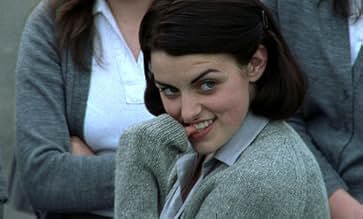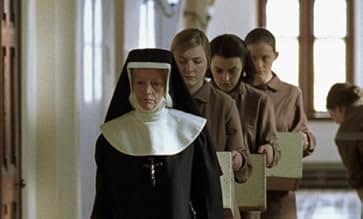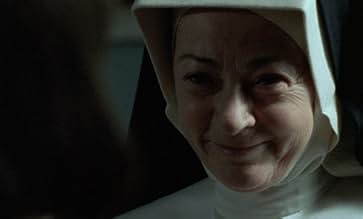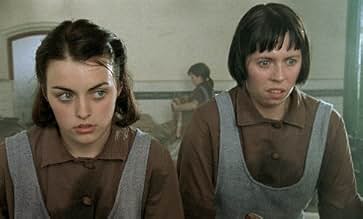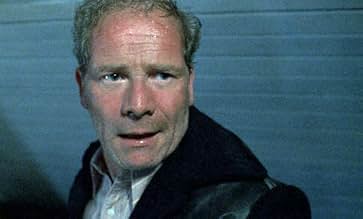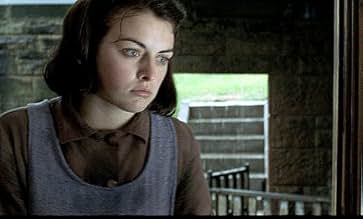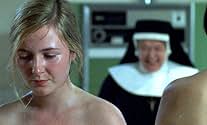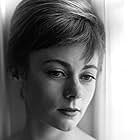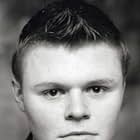Three young Irish women struggle to maintain their spirits while they endure dehumanizing abuse as inmates of a Magdalene Sisters Asylum.Three young Irish women struggle to maintain their spirits while they endure dehumanizing abuse as inmates of a Magdalene Sisters Asylum.Three young Irish women struggle to maintain their spirits while they endure dehumanizing abuse as inmates of a Magdalene Sisters Asylum.
- Nominated for 2 BAFTA Awards
- 18 wins & 15 nominations total
Phyllis MacMahon
- Sister Augusta
- (as Phyllis McMahon)
Chris Patrick-Simpson
- Brendan
- (as Chris Simpson)
- Director
- Writer
- All cast & crew
- Production, box office & more at IMDbPro
Storyline
Did you know
- TriviaPeter Mullan has said that the film was initially made because victims of Magdalene Asylums had no closure. They hadn't received any recognition, compensation, or apology. Many remained lifelong devout Catholics.
- GoofsIn the beginning, a man plays a Taylor acoustic guitar. Taylor Guitars was established in 1974.
- Quotes
Bernadette: Having a baby's not a crime.
Rose: Having a baby before you're married is a mortal sin!
Bernadette: I'd commit any sin, mortal or otherwise, to get the hell out of here.
- Crazy creditsThanks to ... Andy and Marco at Edit-Hire Post Production Services ... all at the Glasgow Film Theatre ... Lee at Lynx ... all the gardeners ... the people of Dumfries ... and all at VFG.
- ConnectionsFeatured in The 2004 IFP/West Independent Spirit Awards (2004)
- SoundtracksThe Well Below the Valley
(uncredited)
Traditional Irish folksong
Sung by the priest at the wedding
Featured review
Peter Mullan's (2002) film is based primarily upon the TV documentary 'Sex in a Cold Climate' by Steve Humphries which was first aired on RTE (Ireland) and BBC (England) in 1998. The documentary records the recollections of four Irish women who spent their youth and a good proportion of their adult lives as involuntary guests of uncompromising Roman Catholic nuns.
The film is set in a particular example of this institution which, somewhat akin to the English workhouses of the late 19th and early 20th century, became established in Ireland after the Second World War. The Magdelene Laundries took their name from the biblical figure of Mary Magdalene, a 'fallen woman' whom Christ befriended.
We join the main heroines of the movie - Margarette (Anne-Marie Duff), Bernadette (Norah-Jane No one), Rose (Dorothy Duffy) and Crispina (Eileen Walsh) in cameo as their entrance scholarships for the Magdelene Laundry are being sat.
What's most uncomfortable about this part of the movie, is trying to work out what's going on. Trying to work out what it is that's being whispered and what will be the upshot of it, and why. At first, it seems like the soundtrack of the film and the contrast have failed. But before long, it becomes obvious that the soundtrack of the film and the contrast have succeeded. The dark and deafening silence surrounding the circumstances under which these young women are being consigned to the unwelcome stewardship of the Magdalene Sisters comes through loud and muted.
We follow their induction into the laundry by Sister Bridget (Geraldine McEwan), ably assisted by the Sisters Jude (Frances Healy), Clemantine (Eithne McGuinness) and Augusta (Phyllis MacMahon) who contrive with formally celibate gentlemen like Father Fitzroy (Daniel Costello) to represent a world in which God's greatest ideal is achieved through punishment and penitence.
As the film progresses, we begin to understand why it is no accident that these institutions should have been laundries. They could - after all - have been bakeries, dairies, canneries or places where mailbags are sewn.
With every garment that passes through the process, unmentionable filth is cleansed - if the Sisters are to be believed. And if the Sisters are to be believed, the sins of the teenagers and the route to Heaven is bound up in hot water, salt and flagellation.
And as we follow these unsaintly girls on their hapless journey, we finally learn that salvation is as straightforward as a letter we are not privileged to read and a brother who arrives with a suitcase - as if there is anything that anybody could possibly want to carry away from a place like this.
This film is a powerful elegy to the suffering of these unfortunate girls who, constrained to silence for so long, have finally found a voice.
The film is set in a particular example of this institution which, somewhat akin to the English workhouses of the late 19th and early 20th century, became established in Ireland after the Second World War. The Magdelene Laundries took their name from the biblical figure of Mary Magdalene, a 'fallen woman' whom Christ befriended.
We join the main heroines of the movie - Margarette (Anne-Marie Duff), Bernadette (Norah-Jane No one), Rose (Dorothy Duffy) and Crispina (Eileen Walsh) in cameo as their entrance scholarships for the Magdelene Laundry are being sat.
What's most uncomfortable about this part of the movie, is trying to work out what's going on. Trying to work out what it is that's being whispered and what will be the upshot of it, and why. At first, it seems like the soundtrack of the film and the contrast have failed. But before long, it becomes obvious that the soundtrack of the film and the contrast have succeeded. The dark and deafening silence surrounding the circumstances under which these young women are being consigned to the unwelcome stewardship of the Magdalene Sisters comes through loud and muted.
We follow their induction into the laundry by Sister Bridget (Geraldine McEwan), ably assisted by the Sisters Jude (Frances Healy), Clemantine (Eithne McGuinness) and Augusta (Phyllis MacMahon) who contrive with formally celibate gentlemen like Father Fitzroy (Daniel Costello) to represent a world in which God's greatest ideal is achieved through punishment and penitence.
As the film progresses, we begin to understand why it is no accident that these institutions should have been laundries. They could - after all - have been bakeries, dairies, canneries or places where mailbags are sewn.
With every garment that passes through the process, unmentionable filth is cleansed - if the Sisters are to be believed. And if the Sisters are to be believed, the sins of the teenagers and the route to Heaven is bound up in hot water, salt and flagellation.
And as we follow these unsaintly girls on their hapless journey, we finally learn that salvation is as straightforward as a letter we are not privileged to read and a brother who arrives with a suitcase - as if there is anything that anybody could possibly want to carry away from a place like this.
This film is a powerful elegy to the suffering of these unfortunate girls who, constrained to silence for so long, have finally found a voice.
- How long is The Magdalene Sisters?Powered by Alexa
Details
- Release date
- Countries of origin
- Official site
- Languages
- Also known as
- Сестри Магдалини
- Filming locations
- Production companies
- See more company credits at IMDbPro
Box office
- Gross US & Canada
- $4,890,878
- Opening weekend US & Canada
- $84,553
- Aug 3, 2003
- Gross worldwide
- $21,107,578
- Runtime1 hour 54 minutes
- Color
- Sound mix
- Aspect ratio
- 1.85 : 1
Contribute to this page
Suggest an edit or add missing content




